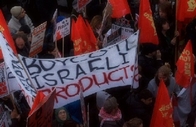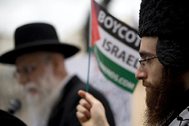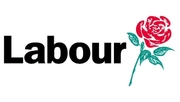29 dec 2015

Two Israeli windsurfers and their coach have been refused visas to compete at the Youth Sailing World Championships in Langkawi, Malaysia.
In response, the World Sailing said, Sunday, that it will investigate reports asserting that all international sailors should be allowed to compete, AP said Monday.
It was added that Malaysian Youth and Sports Minister, Khairy Jamaluddin, earlier, told the Malay Mail Online website that the visa decision was “guided by the existing policy of the Malaysian government” which does not have diplomatic relations with Israel.
Jamaluddin also said, according to PNN, that the Israeli youth team had decided not to adhere to instructions, "so I had to act based on the policies at hand, and I don’t understand why the Malaysian government is seen in a bad light here.”
The Israel Sailing Association said that windsurfers Yoav Omer and Noy Drihan and coach Meir Yaniv would not attend the event that begins Sunday, because they had not received visas.
Amir Gill, chairman of the Israel association, also told local media that Malaysia had placed “unacceptable” demands by forbidding athletes from carrying their country’s flag or wearing any symbol on their attire and surfboards that showed their country of origin.
The youth sailing worlds have been held for 44 years. The Malaysian event, which runs to January 3, is expected to attract about 300 competitors under the age of 19.
In response, the World Sailing said, Sunday, that it will investigate reports asserting that all international sailors should be allowed to compete, AP said Monday.
It was added that Malaysian Youth and Sports Minister, Khairy Jamaluddin, earlier, told the Malay Mail Online website that the visa decision was “guided by the existing policy of the Malaysian government” which does not have diplomatic relations with Israel.
Jamaluddin also said, according to PNN, that the Israeli youth team had decided not to adhere to instructions, "so I had to act based on the policies at hand, and I don’t understand why the Malaysian government is seen in a bad light here.”
The Israel Sailing Association said that windsurfers Yoav Omer and Noy Drihan and coach Meir Yaniv would not attend the event that begins Sunday, because they had not received visas.
Amir Gill, chairman of the Israel association, also told local media that Malaysia had placed “unacceptable” demands by forbidding athletes from carrying their country’s flag or wearing any symbol on their attire and surfboards that showed their country of origin.
The youth sailing worlds have been held for 44 years. The Malaysian event, which runs to January 3, is expected to attract about 300 competitors under the age of 19.
27 dec 2015

At least 25 local municipalities and regional governments in the Spanish State, including Catalunya and the Basque Country, have endorsed resolutions supporting the Boycott, Divestments, and Sanctions (BDS) movement against the Israeli occupation.
BDS is a global movement that aims to level boycotts, divestments, and sanctions against Israel until it complies with international law and Palestinians’ rights.
The resolutions stipulate that Spanish councils and regional governments must boycott Israeli universities, institutions and research centers.
The Palestinian BDS National Committee General Coordinator, Mahmoud Nawajah told Quds Press that the resolutions were a part of the Places Without Racism initiative.
BDS is a global movement that aims to level boycotts, divestments, and sanctions against Israel until it complies with international law and Palestinians’ rights.
The resolutions stipulate that Spanish councils and regional governments must boycott Israeli universities, institutions and research centers.
The Palestinian BDS National Committee General Coordinator, Mahmoud Nawajah told Quds Press that the resolutions were a part of the Places Without Racism initiative.
20 dec 2015

The deanship at the Central University of Barcelona (UAB) announced the official boycott of Israel, with the cut of all kinds of communication and relations with the Israeli universities and institutions which are related directly or indirectly to the occupation.
The university agreed to be a part of the global initiative "places without racism", which included hundreds of municipalities, institutions, universities and organizations in the world.
This achievement, according to Al Ray Palestinian Media Agency, comes in the context of the achievements derived by the Boycott movement network (BDS), operating in dozens of European countries and the Americas, Africa and Australia, which has become a real worry for Israel.
In Spain, the BDS movement was formed in 2007, and promotes many activities with regard to the faciliataion of solidarity and awareness. The movement acts effectively against Israeli lobbying through business, cultural and academic sanctions, and has harvested many achievements in these areas.
The Canary Islands adopted the boycott of Israel two weeks ago, during a visit by Ambassador of the State of Palestine in Spain, Kefah Odeh, in celebration of the International Day of Solidarity with the Palestinian people.
Seville and dozens of other Spanish cities have adopted the boycott movement in support of the Palestinian cause, and the BDS activities.
The university agreed to be a part of the global initiative "places without racism", which included hundreds of municipalities, institutions, universities and organizations in the world.
This achievement, according to Al Ray Palestinian Media Agency, comes in the context of the achievements derived by the Boycott movement network (BDS), operating in dozens of European countries and the Americas, Africa and Australia, which has become a real worry for Israel.
In Spain, the BDS movement was formed in 2007, and promotes many activities with regard to the faciliataion of solidarity and awareness. The movement acts effectively against Israeli lobbying through business, cultural and academic sanctions, and has harvested many achievements in these areas.
The Canary Islands adopted the boycott of Israel two weeks ago, during a visit by Ambassador of the State of Palestine in Spain, Kefah Odeh, in celebration of the International Day of Solidarity with the Palestinian people.
Seville and dozens of other Spanish cities have adopted the boycott movement in support of the Palestinian cause, and the BDS activities.
17 dec 2015
|
|
The Jerusalem Quartet, an Israeli string quartet that has toured around the world and received numerous awards, recently performed in Lisbon, Portugal.
During the performance, BDS activists disrupted the concert by blowing whistles, chanting against the Israeli occupation, and calling for a boycott of Israel. This isn’t the first time the quartet has been confronted by protesters during their performances; for years, activists have disrupted their concerts around the world. Activists cite the quartet’s decision to name itself after Jerusalem and its members’ service in the Israeli military as “Distinguished Musicians” as |
clear evidence of the artists complicity in representing and branding Israel as anything but an apartheid state to the international community.
A member of the Jerusalem Quartet countered in 2010, "We are musicians. We want our audiences to enjoy our music, whoever they may be, whatever their religion or nationality or ethnicity, without unthinking interruptions."
But, as the recent protest in Lisbon shows, activists will not let Jerusalem Quartet members forget that though they may publicly espouse equality, their happy association with Israel is contradictory to any notion of equality or justice.
A member of the Jerusalem Quartet countered in 2010, "We are musicians. We want our audiences to enjoy our music, whoever they may be, whatever their religion or nationality or ethnicity, without unthinking interruptions."
But, as the recent protest in Lisbon shows, activists will not let Jerusalem Quartet members forget that though they may publicly espouse equality, their happy association with Israel is contradictory to any notion of equality or justice.
16 dec 2015

Denmark’s largest private pension fund, FPA Pension, with assets close to $50 billion, is withdrawing its investments from the German construction materials corporation Heidelberg Cement, due to its indirect involvement in exploiting the natural resources of the occupied West Bank, Haaretz said.
FPA said that it doesn’t want to contribute in any way to illegal activity in the West Bank, adding that during 2015 it examined divestment from companies which exploit natural resources in contravention of international law.
The decision is a relatively exceptional way of divesting from companies operating in the West Bank, Haaretz also said, according to WAFA News & Info Agency.
It is a third party boycott – not a boycott against a settlement product or an Israeli company that produces it, but against international entities or companies which have economic ties with Israeli companies operating in the occupied West Bank.
FPA Pension is the second Scandinavian insurance company to divest from Heidelberg Cement in the past half year.
In June, the large Norwegian insurance company KLP also divested from Heidelberg Cement because it operates quarries in the West Bank through Israeli subsidiaries, and is thus exploiting the national resources of an occupied area, in violation of the Geneva Convention.
Heidelberg Cement is one of the largest construction materials companies in the world, operating in more than 40 countries.
In 2007, it acquired the British firm Hanson, which, through its subsidiary, Hanson Israel, operates quarries in Area C of the West Bank, which is under total Israeli control.
Under The Hague Convention and the Fourth Geneva Convention, which define the “laws of occupation,” it is forbidden to use the natural resources of an occupied area if the profits from this benefit the occupiers and not the residents of the area.
To be noted, Israeli settlement activities in the Occupied Palestinian Territories and the Golan Heights, both occupied since 1967, are considered illegal under international law.
The settler population in the West Bank is estimated at 531,000: in late 2012 the population of the West Bank settlements was 341,400; in late 2011 there were 190,423 individuals living in Israeli neighborhoods in East Jerusalem.
Israeli human rights group B'Tselem said, “The settlements have been allocated vast areas, far exceeding their built-up sections. These areas have been declared closed military zones by military orders and are off limits to Palestinians, except by special permit. In contrast, Israeli citizens, Jews from anywhere in the world and tourists may all freely enter these areas.”
According to a report by Applied Research Institute (ARIJ), “The consecutive Israeli governments adopted a policy to acquire much of the West Bank lands to build and expand the Israeli settlements by employing different methods; most renowned of which, “Security,” which is also, how Israel was able to restrict Palestinian towns’ development on the remaining areas.”
FPA said that it doesn’t want to contribute in any way to illegal activity in the West Bank, adding that during 2015 it examined divestment from companies which exploit natural resources in contravention of international law.
The decision is a relatively exceptional way of divesting from companies operating in the West Bank, Haaretz also said, according to WAFA News & Info Agency.
It is a third party boycott – not a boycott against a settlement product or an Israeli company that produces it, but against international entities or companies which have economic ties with Israeli companies operating in the occupied West Bank.
FPA Pension is the second Scandinavian insurance company to divest from Heidelberg Cement in the past half year.
In June, the large Norwegian insurance company KLP also divested from Heidelberg Cement because it operates quarries in the West Bank through Israeli subsidiaries, and is thus exploiting the national resources of an occupied area, in violation of the Geneva Convention.
Heidelberg Cement is one of the largest construction materials companies in the world, operating in more than 40 countries.
In 2007, it acquired the British firm Hanson, which, through its subsidiary, Hanson Israel, operates quarries in Area C of the West Bank, which is under total Israeli control.
Under The Hague Convention and the Fourth Geneva Convention, which define the “laws of occupation,” it is forbidden to use the natural resources of an occupied area if the profits from this benefit the occupiers and not the residents of the area.
To be noted, Israeli settlement activities in the Occupied Palestinian Territories and the Golan Heights, both occupied since 1967, are considered illegal under international law.
The settler population in the West Bank is estimated at 531,000: in late 2012 the population of the West Bank settlements was 341,400; in late 2011 there were 190,423 individuals living in Israeli neighborhoods in East Jerusalem.
Israeli human rights group B'Tselem said, “The settlements have been allocated vast areas, far exceeding their built-up sections. These areas have been declared closed military zones by military orders and are off limits to Palestinians, except by special permit. In contrast, Israeli citizens, Jews from anywhere in the world and tourists may all freely enter these areas.”
According to a report by Applied Research Institute (ARIJ), “The consecutive Israeli governments adopted a policy to acquire much of the West Bank lands to build and expand the Israeli settlements by employing different methods; most renowned of which, “Security,” which is also, how Israel was able to restrict Palestinian towns’ development on the remaining areas.”
8 dec 2015

The Israeli ministry of foreign affairs has said that six European states will not be able to continue carrying out projects in Palestinian areas because of their involvement in labeling products of Israeli settlements.
Sweden, Belgium, Ireland, France, Luxembourg and Malta will no longer be able, in varying degrees, to carry out or take part in projects for the Palestinians in their areas, the ministry threatened.
Walla News website quoted a senior Israeli official from the ministry as saying that "Israel cooperated with some of these countries in the past to institute projects to rehabilitate the Gaza Strip and strengthen the Palestinian Authority, but this is going to change and they will begin to encounter difficulties and obstacles."
"The goal of this new attitude," the official said, "is to clarify to the countries that pushed for the product labeling that their actions have a price in the Palestinian arena."
Sweden, Belgium, Ireland, France, Luxembourg and Malta will no longer be able, in varying degrees, to carry out or take part in projects for the Palestinians in their areas, the ministry threatened.
Walla News website quoted a senior Israeli official from the ministry as saying that "Israel cooperated with some of these countries in the past to institute projects to rehabilitate the Gaza Strip and strengthen the Palestinian Authority, but this is going to change and they will begin to encounter difficulties and obstacles."
"The goal of this new attitude," the official said, "is to clarify to the countries that pushed for the product labeling that their actions have a price in the Palestinian arena."
4 dec 2015

Israel is expected to complicate relations with EU countries over settlement labeling.
In response to recently issued EU directives about labeling the origin of settlement products, Netanyahu suspended Israeli dialogue with the EU on the peace process.
The last meeting on the Israeli-Palestinian peace process was in 2014 and EU involvement was minor.
In addition to suspending EU involvement in the peace talks, Israel plans to complicate relations with the six countries that the foreign ministry identified as the primary promoters of the EU’s decision to label Israeli settlement products – namely, Sweden, Belgium, Ireland, France, Luxemburg and Malta.
Walla! News quoted a senior Israeli official saying that though Israel “cooperated” with some of these countries in the past to institute projects to rehabilitate the Gaza Strip and strengthen the Palestinian Authority, “this is going to change – they will begin to encounter difficulties and obstacles.”
“The goal” of this new attitude, the official said, is “to clarify to the countries that pushed for the product labeling that their actions have a price in the Palestinian arena.”
In other words, Israel will punish countries for supporting Palestinians by punishing Palestinians. In doing so, Israel will also, unconincidentally, punish Palestinians for receiving international support.
But at the same time as Israel flaunts its ability to penalize supporting countries via Palestinians for the EU’s ruling, Israeli representatives maintain that labeling settlement products is an uncalled for form of discrimination against Israel.
Speaker of the Knesset Yuli Edelstein on Wednesday evening, 2 December 2015, spoke to a special session of the Bundestag's Committee on Foreign Affairs and Defense Committee -- the pinnacle event of the Knesset delegation's official visit to Germany this month to mark 50 years since the establishment of relations between Israel and Germany.
Edelstein described it as “unfortunate” that "Europe has become fertile ground for BDS organizations that employ improper methods such as economic and academic boycotts against Israel.”
He thanked committee members for their opposition to the EU’s labeling plan, deeming it an “outrageous measure” that operates “according to a double standard and out of blind hatred.”
Then, ignoring the fact that since Israel’s inception the government has targeted Palestinians as a people for – often, deathly – discriminatory treatment, Edelstein told the committee: “‘where they burn books, they will also ultimately burn people,’ Heine wrote, and I fear that where goods are labeled according to the place in which they were manufactured, people will be labeled according to their ethnicity.”
In this sense, to denounce the EU’s decision, Israel is threatening to worsen Palestinians’ access to international support. Then, to distract from the way such a threat unfairly targets an entire population and is emblematic of Israel’s mistreatment of Palestinians, Israel levels the hypocritical claim that the EU’s decision is baseless and unfair to Israel.
Israeli officials are also acting on Netanyahu’s call to cease cooperation with countries that promoted the EU’s decision to label Israeli settlement products.
Channel 10 reported that Netanyahu recently rejected a request from the Belgian foreign minister to meet during his visit to the region, as did Deputy Foreign Minister Tsipi Hotovely.
But, Israel is more forgiving of some countries than others. While maintaining that Israel is “angry” at France, an Israeli official said that France is “in a little different category than the rest of the countries.” Fittingly, Deputy Foreign Minister Tsipi Hotovely will travel to France in two weeks, where she plans to discuss the EU’s decision with French officials.
In response to recently issued EU directives about labeling the origin of settlement products, Netanyahu suspended Israeli dialogue with the EU on the peace process.
The last meeting on the Israeli-Palestinian peace process was in 2014 and EU involvement was minor.
In addition to suspending EU involvement in the peace talks, Israel plans to complicate relations with the six countries that the foreign ministry identified as the primary promoters of the EU’s decision to label Israeli settlement products – namely, Sweden, Belgium, Ireland, France, Luxemburg and Malta.
Walla! News quoted a senior Israeli official saying that though Israel “cooperated” with some of these countries in the past to institute projects to rehabilitate the Gaza Strip and strengthen the Palestinian Authority, “this is going to change – they will begin to encounter difficulties and obstacles.”
“The goal” of this new attitude, the official said, is “to clarify to the countries that pushed for the product labeling that their actions have a price in the Palestinian arena.”
In other words, Israel will punish countries for supporting Palestinians by punishing Palestinians. In doing so, Israel will also, unconincidentally, punish Palestinians for receiving international support.
But at the same time as Israel flaunts its ability to penalize supporting countries via Palestinians for the EU’s ruling, Israeli representatives maintain that labeling settlement products is an uncalled for form of discrimination against Israel.
Speaker of the Knesset Yuli Edelstein on Wednesday evening, 2 December 2015, spoke to a special session of the Bundestag's Committee on Foreign Affairs and Defense Committee -- the pinnacle event of the Knesset delegation's official visit to Germany this month to mark 50 years since the establishment of relations between Israel and Germany.
Edelstein described it as “unfortunate” that "Europe has become fertile ground for BDS organizations that employ improper methods such as economic and academic boycotts against Israel.”
He thanked committee members for their opposition to the EU’s labeling plan, deeming it an “outrageous measure” that operates “according to a double standard and out of blind hatred.”
Then, ignoring the fact that since Israel’s inception the government has targeted Palestinians as a people for – often, deathly – discriminatory treatment, Edelstein told the committee: “‘where they burn books, they will also ultimately burn people,’ Heine wrote, and I fear that where goods are labeled according to the place in which they were manufactured, people will be labeled according to their ethnicity.”
In this sense, to denounce the EU’s decision, Israel is threatening to worsen Palestinians’ access to international support. Then, to distract from the way such a threat unfairly targets an entire population and is emblematic of Israel’s mistreatment of Palestinians, Israel levels the hypocritical claim that the EU’s decision is baseless and unfair to Israel.
Israeli officials are also acting on Netanyahu’s call to cease cooperation with countries that promoted the EU’s decision to label Israeli settlement products.
Channel 10 reported that Netanyahu recently rejected a request from the Belgian foreign minister to meet during his visit to the region, as did Deputy Foreign Minister Tsipi Hotovely.
But, Israel is more forgiving of some countries than others. While maintaining that Israel is “angry” at France, an Israeli official said that France is “in a little different category than the rest of the countries.” Fittingly, Deputy Foreign Minister Tsipi Hotovely will travel to France in two weeks, where she plans to discuss the EU’s decision with French officials.
1 dec 2015

Szentgotthárd Mayor Gábor Huszár says 'business circles which are likely backed by the Jewish state are trying to pit Christian Europe against the Muslims,' but offers apology after his comments were made public.
A mayor of a city in Hungary has accused Israel of being behind the terror attacks in Paris last month, but was quick to offer an apology after a recording of his comments was leaked to local media.
Speaking during a November 16 council meeting over the expansion of a nearby refugee camp, Szentgotthárd Mayor Gábor Huszár said: "Everyone should just take my word for it. What happened in Paris is clear evidence that certain business circles, dare I say business circles which are likely backed by the Jewish state, are trying to pit Christian Europe against the Muslims."
According to media in the country, Huszár was trying to placate concerns over the expansion of the refugee camp by arguing that the Muslim refugees were not to blame for the November 13 attack in the French capital that claimed the lives of 130 people.
Mayor Huszár is a member of Hungarian Prime Minister Viktor Orbán's ruling party. Orbán said after the events in Paris that "all the terrorists are basically migrants," and called on the European Union to "reevaluate what unites it, in light of the security challenges Europe has been facing in recent years."
Israel's Ambassador to Hungary, Ilan Mor, harshly condemned the mayor, saying his comments "again prove that there are those who have not learned from history and continue to propagate negative views and conspiracy theories against the Jewish state, Israel. Such statements have led to the great tragedy of Jews in Hungary. Unfortunately, these false and laughable statements were by a public figure, Szentgotthárd's mayor."
Following the release of the recording, Huszár apologized for his "unfortunate statement." In addition, the spokesman for the ruling Fidesz party said the mayor expressed a private opinion and that the party condemns all kinds of terrorism and believes ISIS is behind the terror attack in Paris.
Hungarian Foreign Ministry Péter Szijjártó said during a visit to Israel last month that Hungary is opposed to the decision to label products from the settlements.
"It's not effective and will not solve the Israeli-Palestinian conflict," Szijjártó said.
A mayor of a city in Hungary has accused Israel of being behind the terror attacks in Paris last month, but was quick to offer an apology after a recording of his comments was leaked to local media.
Speaking during a November 16 council meeting over the expansion of a nearby refugee camp, Szentgotthárd Mayor Gábor Huszár said: "Everyone should just take my word for it. What happened in Paris is clear evidence that certain business circles, dare I say business circles which are likely backed by the Jewish state, are trying to pit Christian Europe against the Muslims."
According to media in the country, Huszár was trying to placate concerns over the expansion of the refugee camp by arguing that the Muslim refugees were not to blame for the November 13 attack in the French capital that claimed the lives of 130 people.
Mayor Huszár is a member of Hungarian Prime Minister Viktor Orbán's ruling party. Orbán said after the events in Paris that "all the terrorists are basically migrants," and called on the European Union to "reevaluate what unites it, in light of the security challenges Europe has been facing in recent years."
Israel's Ambassador to Hungary, Ilan Mor, harshly condemned the mayor, saying his comments "again prove that there are those who have not learned from history and continue to propagate negative views and conspiracy theories against the Jewish state, Israel. Such statements have led to the great tragedy of Jews in Hungary. Unfortunately, these false and laughable statements were by a public figure, Szentgotthárd's mayor."
Following the release of the recording, Huszár apologized for his "unfortunate statement." In addition, the spokesman for the ruling Fidesz party said the mayor expressed a private opinion and that the party condemns all kinds of terrorism and believes ISIS is behind the terror attack in Paris.
Hungarian Foreign Ministry Péter Szijjártó said during a visit to Israel last month that Hungary is opposed to the decision to label products from the settlements.
"It's not effective and will not solve the Israeli-Palestinian conflict," Szijjártó said.
30 nov 2015

The Israeli Prime Minister Benjamin Netanyahu has ordered the Foreign Ministry to cease its political contacts with the European Union (EU), Israeli news outlets reported Sunday.
Netanyahu ordered the suspension of all political meetings with EU institutions and representatives and called for a re-evaluation of the EU role in the so-called peace process with the Palestinians.
This directive was made in response to the EU decision to mark products from illegal Israeli settlements.
Netanyahu ordered the suspension of all political meetings with EU institutions and representatives and called for a re-evaluation of the EU role in the so-called peace process with the Palestinians.
This directive was made in response to the EU decision to mark products from illegal Israeli settlements.
24 nov 2015

The British Labour Party will no longer be doing business with G4S.
The National Executive Committee of the party voted 12-4 to boycott G4S over its involvement with Israeli repression against Palestinians - providing security systems and control rooms to Israeli prisons imprisoning Palestinian prisoners and equipment to Israeli police training centers in Jerusalem.
Campaigners have long called upon the Labour Party to stop doing business with G4S, whose human rights abuses are not limited to Palestine but include its record on forced deportations from the United Kingdom, prisons in South Africa, mining companies in Canada and elsewhwere. Protests have taken place outside Labour Party conferences calling for an end to the contracts with G4S. Palestinian political prisoners have urged international action to boycott G4Shave urged international action to boycott G4S.
This comes as 220 Palestinian and international organizations are calling on the United Nations to stop doing business with G4S. The UN provides G4S, the world's largest private security corporation, with $22 million in business annually. A week of action began on Monday with a protest in New York City during the UN's commemoration of the International Day of Solidarity with the Palestinian People, calling on the UN to join the boycott of G4S.
G4S security systems and control rooms are used in the Israeli prisons that imprison Palestinian political prisoners, and in the interrogation centers where Palestinians - including children - are tortured and abused. G4S is also providing equipment to the Israeli police training center in Jerusalem, training Israeli police in the suppression of Palestinians in Jerusalem. Through these contracts, G4S is involved in the imprisonment of over 6,500 Palestinian political prisoners and the Israeli attacks on Palestinians in Jerusalem, including Israeli attacks on Al-Aqsa Mosque.
The Gates Foundation divested its $170 million investment in G4S in 2014 after a global campaign, and universities in Europe and the UK have rejected contracts with G4S over its actions in Palestine.
Samidoun: Palestinian Prisoner Solidarity Network is a network of organizers and activists, based in North America, working to build solidarity with Palestinian prisoners in their struggle for freedom.
At AIC official: An Open Letter to Israeli Activists
The National Executive Committee of the party voted 12-4 to boycott G4S over its involvement with Israeli repression against Palestinians - providing security systems and control rooms to Israeli prisons imprisoning Palestinian prisoners and equipment to Israeli police training centers in Jerusalem.
Campaigners have long called upon the Labour Party to stop doing business with G4S, whose human rights abuses are not limited to Palestine but include its record on forced deportations from the United Kingdom, prisons in South Africa, mining companies in Canada and elsewhwere. Protests have taken place outside Labour Party conferences calling for an end to the contracts with G4S. Palestinian political prisoners have urged international action to boycott G4Shave urged international action to boycott G4S.
This comes as 220 Palestinian and international organizations are calling on the United Nations to stop doing business with G4S. The UN provides G4S, the world's largest private security corporation, with $22 million in business annually. A week of action began on Monday with a protest in New York City during the UN's commemoration of the International Day of Solidarity with the Palestinian People, calling on the UN to join the boycott of G4S.
G4S security systems and control rooms are used in the Israeli prisons that imprison Palestinian political prisoners, and in the interrogation centers where Palestinians - including children - are tortured and abused. G4S is also providing equipment to the Israeli police training center in Jerusalem, training Israeli police in the suppression of Palestinians in Jerusalem. Through these contracts, G4S is involved in the imprisonment of over 6,500 Palestinian political prisoners and the Israeli attacks on Palestinians in Jerusalem, including Israeli attacks on Al-Aqsa Mosque.
The Gates Foundation divested its $170 million investment in G4S in 2014 after a global campaign, and universities in Europe and the UK have rejected contracts with G4S over its actions in Palestine.
Samidoun: Palestinian Prisoner Solidarity Network is a network of organizers and activists, based in North America, working to build solidarity with Palestinian prisoners in their struggle for freedom.
At AIC official: An Open Letter to Israeli Activists
23 nov 2015

With over 10,000 members, the American Anthropological Association (AAA) has become the largest scholarly institution in the United States to endorse the academic boycott of Israel when its general conference voted overwhelmingly, last night, for a Boycott, Divestment and Sanctions (BDS) resolution.
The historic vote attracted an unprecedented 1176 votes, with 1,040 votes for the motion (88.5%) to boycott Israeli academic institutions and 136 votes (11.5%) against the motion. This paves the way for the entire AAA membership to vote on the resolution in the coming months. An anti-BDS resolution was resoundingly defeated at the conference just before the vote for the BDS resolution.
The AAA BDS resolution states, according to PNN:
“Be it resolved that the AAA as an Association endorses and will honor this [PACBI] call from Palestinian civil society to boycott Israeli academic institutions until such time as these institutions end their complicity in violating Palestinian rights as stipulated in international law.”
Anthropologists for the Boycott of Israeli Academic Institutions, the group that led this effort in the AAA, issued a statement saying:
“As heirs to a long tradition of scholarship on colonialism, anthropologists affirm, through this resolution, that the core problem is Israel’s maintenance of a settler colonial regime based on Jewish supremacy and Palestinian dispossession. By supporting the boycott, anthropologists are taking a stand for justice through action in solidarity with Palestinians.”
The AAA vote for an academic boycott of Israel follows similar votes, also with overwhelming majorities, at the American Studies Association, the Asian American Studies Association and several others, continuing a snowballing academic boycott trend that Israeli president Reuven Rivlin considers as a “strategic threat of the first order.” The US Campaign for the Academic and Cultural Boycott of Israel (USACBI) leads the efforts aimed at spreading the academic boycott of Israel in the U.S. academy.
BDS was launched in 2005 by the overwhelming majority in Palestinian society to isolate Israel in order to bring about its compliance with its obligations under international law, by ending its occupation, apartheid and denial of Palestinian refugee rights.
Rooted in a long heritage of Palestinian popular resistance and inspired by the South African anti-apartheid movement and the US Civil Rights movement, BDS calls for boycott, divestment and sanctions against Israel in all fields.
Israeli academic institutions are particularly targeted due to what the Palestinian Campaign for the Academic and Cultural Boycott of Israel (PACBI) calls, their “persistent and deep complicity in planning, implementing and whitewashing crimes against the Palestinian people by Israel’s regime of occupation, settler-colonialism and apartheid.”
PACBI, the part of the Palestinian BDS National Committee (BNC) tasked with overseeing the academic and cultural boycott aspects of BDS, has since 2004 advocated for a boycott of Israeli academic and cultural institutions.
“Anthropologists at the AAA conference have sent a clear message of international solidarity with Palestinians and upheld some of the best values of the profession,” commented Prof. Lisa Taraki, a leading Palestinian sociologist at Birzeit University and a co-founder of PACBI.
She added, “Palestinian academics, students and society at large are deeply inspired by this most effective expression of solidarity with our struggle for freedom, justice and equality. It reminds us of similar initiatives taken by academics and academic associations worldwide in the 1980s in support of the academic boycott of South Africa under apartheid.”
Prof. Haidar Eid, a Gaza-based comparative literature professor and a PACBI steering committee member noted, “PACBI wishes to acknowledge, with deep gratitude, the tireless, effective, strategic and principled efforts of all the academics who diligently worked for several years to achieve this remarkable victory for the academic boycott of Israel.”
Prof. Eid added, “We are certain that this outstanding expression of support for the Palestinian-led BDS movement will further galvanize academics to pursue the institutional boycott of Israel. As in the South African anti-apartheid struggle, the boycott of complicit institutions will significantly contribute to the long march towards Palestinian liberation and self-determination.”
Contact: [email protected]
The historic vote attracted an unprecedented 1176 votes, with 1,040 votes for the motion (88.5%) to boycott Israeli academic institutions and 136 votes (11.5%) against the motion. This paves the way for the entire AAA membership to vote on the resolution in the coming months. An anti-BDS resolution was resoundingly defeated at the conference just before the vote for the BDS resolution.
The AAA BDS resolution states, according to PNN:
“Be it resolved that the AAA as an Association endorses and will honor this [PACBI] call from Palestinian civil society to boycott Israeli academic institutions until such time as these institutions end their complicity in violating Palestinian rights as stipulated in international law.”
Anthropologists for the Boycott of Israeli Academic Institutions, the group that led this effort in the AAA, issued a statement saying:
“As heirs to a long tradition of scholarship on colonialism, anthropologists affirm, through this resolution, that the core problem is Israel’s maintenance of a settler colonial regime based on Jewish supremacy and Palestinian dispossession. By supporting the boycott, anthropologists are taking a stand for justice through action in solidarity with Palestinians.”
The AAA vote for an academic boycott of Israel follows similar votes, also with overwhelming majorities, at the American Studies Association, the Asian American Studies Association and several others, continuing a snowballing academic boycott trend that Israeli president Reuven Rivlin considers as a “strategic threat of the first order.” The US Campaign for the Academic and Cultural Boycott of Israel (USACBI) leads the efforts aimed at spreading the academic boycott of Israel in the U.S. academy.
BDS was launched in 2005 by the overwhelming majority in Palestinian society to isolate Israel in order to bring about its compliance with its obligations under international law, by ending its occupation, apartheid and denial of Palestinian refugee rights.
Rooted in a long heritage of Palestinian popular resistance and inspired by the South African anti-apartheid movement and the US Civil Rights movement, BDS calls for boycott, divestment and sanctions against Israel in all fields.
Israeli academic institutions are particularly targeted due to what the Palestinian Campaign for the Academic and Cultural Boycott of Israel (PACBI) calls, their “persistent and deep complicity in planning, implementing and whitewashing crimes against the Palestinian people by Israel’s regime of occupation, settler-colonialism and apartheid.”
PACBI, the part of the Palestinian BDS National Committee (BNC) tasked with overseeing the academic and cultural boycott aspects of BDS, has since 2004 advocated for a boycott of Israeli academic and cultural institutions.
“Anthropologists at the AAA conference have sent a clear message of international solidarity with Palestinians and upheld some of the best values of the profession,” commented Prof. Lisa Taraki, a leading Palestinian sociologist at Birzeit University and a co-founder of PACBI.
She added, “Palestinian academics, students and society at large are deeply inspired by this most effective expression of solidarity with our struggle for freedom, justice and equality. It reminds us of similar initiatives taken by academics and academic associations worldwide in the 1980s in support of the academic boycott of South Africa under apartheid.”
Prof. Haidar Eid, a Gaza-based comparative literature professor and a PACBI steering committee member noted, “PACBI wishes to acknowledge, with deep gratitude, the tireless, effective, strategic and principled efforts of all the academics who diligently worked for several years to achieve this remarkable victory for the academic boycott of Israel.”
Prof. Eid added, “We are certain that this outstanding expression of support for the Palestinian-led BDS movement will further galvanize academics to pursue the institutional boycott of Israel. As in the South African anti-apartheid struggle, the boycott of complicit institutions will significantly contribute to the long march towards Palestinian liberation and self-determination.”
Contact: [email protected]
